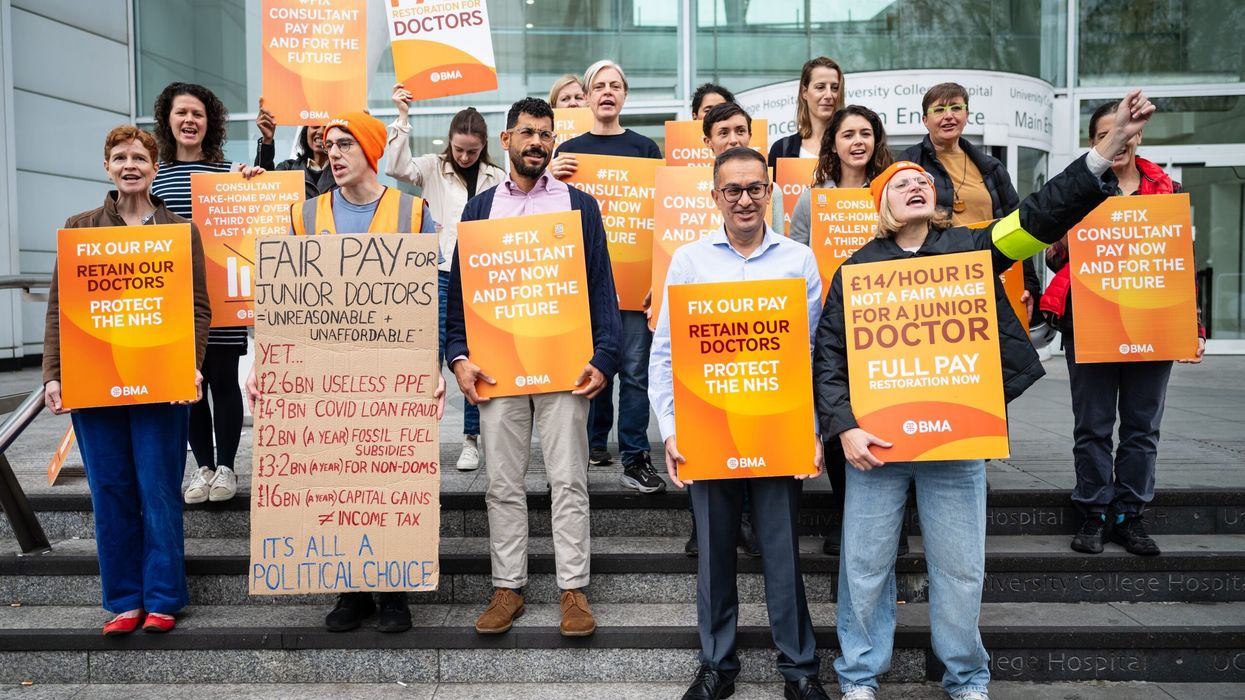Health chiefs warned this weekend that Rishi Sunak's goal for the NHS, aiming to eradicate wait times surpassing 65 weeks by March, might fall short due to impending NHS strike action.
The health system braces for an unprecedented six-day national strike by junior doctors in England starting Wednesday (3) at 7 am, potentially leading to a significant number of cancellations across NHS trusts, The Guardian reported.
The ongoing strikes by consultants, junior doctors, and nurses have impeded efforts to reduce the backlog for consultant-led elective care, which surpassed 7.7 million cases by October end, across NHS England.
The British Medical Association (BMA) highlighted the potential for additional strike action in 2024 by junior doctors unless the government presented a credible proposal.
Matthew Taylor, the CEO of the NHS Confederation representing the healthcare system in England, Wales, and Northern Ireland, expressed concern over the impact of the strike on numerous trusts.
He emphasised the precariousness of many trusts due to thin staffing and their vulnerable state during what could be one of the most demanding weeks for the NHS.
Taylor indicated that the collective effect of ongoing industrial action made achieving the target to eliminate 65-week waits for elective treatment by March 2024 increasingly unlikely.
He noted that while the target was already challenging, the impact of industrial action seemed to push it out of reach, stating, "It was always a really hard target and if we had not had industrial action, we would have got pretty close. With industrial action, it looks like it’s beyond our reach."
Taylor noted the NHS's progress in managing waiting lists for treatments through various initiatives, such as introducing new surgical hubs with additional operating facilities and beds.
Sunak's commitment to reducing hospital waiting lists last January, outlined as one of the key priorities for a general election, was made when there were 7.21 million consultant-led treatments on the waiting list.
Current figures indicate an increase of approximately 500,000 treatments and appointments compared to January.
Recent NHS hospital performance reports shared with trust boards shed light on the challenges health leaders face in meeting the target. As of October, 107,433 cases were waiting for more than 65 weeks.
In papers submitted to the board of the Norfolk and Norwich University Hospitals NHS Foundation Trust in November, it was highlighted that they were not on course to meet the March target.
The paper stated industrial action has notably decreased the pace of 65-week activity prior to, during, and post periods (of industrial action). The initial estimate of 900 patients awaiting over 65 weeks by March 31, 2024, is now projected to be around 2,300.
The board of University Hospital Bristol and Weston NHS Foundation Trust received a report this month detailing the adverse effects of industrial action on their efforts to minimise prolonged waits.
According to the papers, the impact of industrial action has predictably contributed to a decline, with the number of patients waiting longer than 65 weeks rising to 2,183 by the end of September 2023 against a projected plan of no more than 1,260.
Professor Joe Harrison, chief executive at Milton Keynes University Hospital NHS Foundation Trust, anticipated that approximately one-third of planned operations would be cancelled during the junior doctors' strike.
He said, “We are clearly concerned because the beginning of January is always one of the busiest times of the year.”
Highlighting the potential risks for patients facing cancelled planned procedures, Harrison mentioned worries about meeting the target of eliminating 65-week waits by March.
However, he suggested it could be achievable if there were no further industrial action.
Harrison said that recent figures released last week indicated that the NHS app now boasts 33.6 million registered users, including three-quarters of adults in England. He considered that digital services could potentially alleviate pressures on frontline staff.
Dr Rob Laurenson, co-chair of the BMA’s junior doctors committee, expressed hesitation towards resorting to strike actions while calling for meaningful negotiations with the government.
Laurenson said no doctor wishes to partake in a strike, urging the government to return to the negotiation table with a credible offer. He added that doing this would enable them to present it to their members and prevent additional strike actions.
However, without substantial progress, he said, they may need to contemplate further industrial action, and even extend their mandate.
The responsibility lies with the government to cease the strikes, to avoid squandering time and resources, and to prevent additional disruptions to patient care.
Presenting a credible offer could circumvent the necessity for further strike actions, he said.
Health trusts highlighted their efforts to diminish lengthy wait times for operations. A representative from Manchester University NHS Foundation Trust emphasised their success in the elective hubs, dedicated to expeditiously and effectively performing planned surgeries without compromising quality.
The Trafford Hub, for instance, completed over 7,500 operations in the past year, maintaining a record of zero cancellations due to capacity issues.
An NHS spokesperson said there has been a reduction of nearly 200,000 patients from the waiting list during the break in industrial action over the last ten weeks, stating the NHS has worked hard to achieve a 20% decrease in patients waiting beyond 65 weeks.
The upcoming six-day strike this week marks the lengthiest industrial action in NHS history, posing additional challenges for planned care, adding to over 45 days already disrupted due to strikes.
However, healthcare professionals across the NHS remain committed to delivering optimal care to patients, with a determination to further diminish prolonged waiting times as the new year begins, the spokesperson said.




